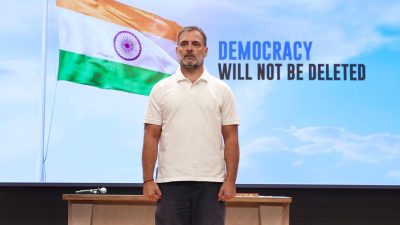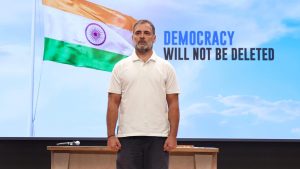Aishwarya Khosla is a journalist currently serving as Deputy Copy Editor at The Indian Express. Her writings examine the interplay of culture, identity, and politics. She began her career at the Hindustan Times, where she covered books, theatre, culture, and the Punjabi diaspora. Her editorial expertise spans the Jammu and Kashmir, Himachal Pradesh, Chandigarh, Punjab and Online desks. She was the recipient of the The Nehru Fellowship in Politics and Elections, where she studied political campaigns, policy research, political strategy and communications for a year. She pens The Indian Express newsletter, Meanwhile, Back Home. Write to her at aishwaryakhosla.ak@gmail.com or aishwarya.khosla@indianexpress.com. You can follow her on Instagram: @ink_and_ideology, and X: @KhoslaAishwarya. ... Read More
Who is Vajra Chandrasekera — winner of the 2025 Ursula K Le Guin Prize for Fiction
The Sri Lankan novelist behind Rakesfall writes about power, empire and imagination. His Le Guin Prize acceptance speech showed how sharply those ideas cut into the present.
 Sri Lankan author Vajra Chandrasekera’s second novel, Rakesfall, has won the 2025 Ursula K. Le Guin Prize for Fiction. (Photo Credit: Sanjeewa Weerasinghe/Macmillion)
Sri Lankan author Vajra Chandrasekera’s second novel, Rakesfall, has won the 2025 Ursula K. Le Guin Prize for Fiction. (Photo Credit: Sanjeewa Weerasinghe/Macmillion) Sri Lankan author Vajra Chandrasekera’s second novel, Rakesfall, has won the 2025 Ursula K Le Guin Prize for Fiction, a $25,000 (approximately Rs 22 lakh) award recognising “writers who imagine real grounds for hope.”
Chandrasekera’s novels move between myth, politics and philosophy. In them, the ghosts of empire share space with the mechanics of faith and the ruins of progress.
The judging panel—Matt Bell, Indra Das, Kelly Link, Sequoia Nagamatsu and Rebecca Roanhorse—called the book “a titanic work of art… as fluid and changing as water,” comparing Chandrasekera’s moral clarity to Le Guin’s own.
A novelist from Colombo
 The Saint of Bright Doors (2023) is Vajra Chandrasekera’s debut book.
The Saint of Bright Doors (2023) is Vajra Chandrasekera’s debut book.
Born and based in Colombo, Chandrasekera has become one of speculative fiction’s most original new voices. His debut, The Saint of Bright Doors (2023), was named a New York Times Notable Book and shortlisted for several major awards.
Rakesfall, published by Tor Books in April, follows two souls, Annelid and Leveret, who meet as children during the Sri Lankan civil war and recur through lifetimes, each era reshaping their bond. The book’s central concern is the persistence of power and the stories that sustain it.
A book about power
“Rakesfall is a book about power,” Chandrasekera said in his acceptance video. “About the arrogance and undeserved self-belief of the powerful, their bottomless desire for more wealth and control, until they strive not only for a throne but for godhood. This is the world we already live in.”
He linked that hunger to what he called “late capitalism’s death drive”—a system willing to sacrifice the present “in pursuit of an imaginary future.”
Chandrasekera then extended his argument beyond literature. “The speculative genres,” he said, “are as fertile ground for monstrous imaginations as they are marvellous ones. There is nothing inherently liberatory in the imagination, but it must be made so.”
Chandrasekera’s novels are about the moral cost of looking away, and how the structures of violence repeat because they are forgotten or disguised.
Chandrasekera’s path to this moment has been shaped by both Sri Lanka’s political history and global literary currents. Before publishing novels, he edited short fiction at Strange Horizons and The Deadlands, and his stories appeared in Clarkesworld and West Branch. Next year, he will join the Cullman Center for Scholars and Writers at the New York Public Library as a fellow.
Chandrasekera often rejects the idea that science fiction is separate from reality. His characters live in worlds of myth and metaphor, but their questions, who gets to define truth, and who pays for it, are inherently political.
The Le Guin legacy
 Ursula K Le Guin is best known for her speculative fiction. (Wikimedia Commons)
Ursula K Le Guin is best known for her speculative fiction. (Wikimedia Commons)
Ursula K Le Guin (1929–2018), was one of the most influential writers of the 20th century, best known for The Left Hand of Darkness and The Dispossessed. Her fiction, spanning science fiction, fantasy and realism, challenged traditional ideas of gender, power and community. Le Guin saw imagination as a political act, “a way to name the nameless and give voice to the voiceless.”
Now in its fourth year, the Le Guin Prize is administered by the Ursula K Le Guin Foundation and celebrates fiction that embodies the late author’s values, especially the courage to imagine alternatives.
Opening the online ceremony, Le Guin’s son, Theo Downes-Le Guin, said the prize seeks to honour “writers who may not yet be household names, or whose access to resources may be limited.” Actor Ebon Moss-Bachrach, hosting the event, described the shortlist as “thrillingly varied,” before announcing Chandrasekera’s win. “This is the world we already live in.”
Le Guin once said that imaginative fiction “names the nameless and gives voice to the voiceless.” Chandrasekera shares that ethos. His prose, grounded in Sri Lankan history yet open to the cosmic, and treats imagination as an act of memory.





- 01
- 02
- 03
- 04
- 05



























